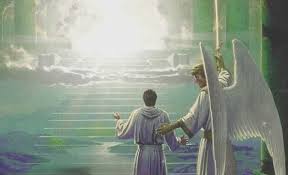
The Death of Death
“But you have come to Mount Zion and to the city of the living God, the heavenly Jerusalem,
to an innumerable company of angels,
to God the Judge of all,
to the spirits of just men made perfect,
to Jesus the Mediator of the new covenant,
to the general assembly and church of the firstborn who are registered in heaven,
and to the blood of sprinkling that speaks better things than that of Abel.”
(Hebrews 12:22-24)
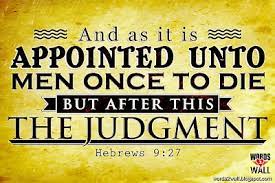
The Last Judgment

On God as Judge
Many people today look forward to dying so they can be rewarded for having lived a "good life." Others believe that death will be them ceasing to exist. They surmise, perhaps out of ignorance, is that death is a kind of Nirvana, the end of one's existence, "the snuffing out of the candle" at death. Reincarnation underlies the heart of Hinduism. Buddhism teaches suffering, and that meditation, spiritual and physical labor, and good behavior are the ways to achieve nirvana. Taoism holds that humans and animals should live in balance with the Tao, or the universe. Taoists believe in spiritual immortality, where the spirit of the body joins the universe after death.
In spite of centuries spent preparing to die the death rate of man is still one hundred percent. The Bible describes two main judgments after death: The Judgment Seat of Christ for Christians and the Last Judgment for everyone else. See the above links in this article to understand both. They are very different.

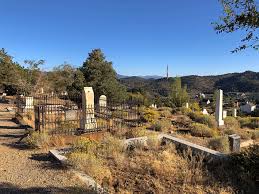
The Death of Death
by Ray Stedman
Ray Stedman talks about the Christian world view:
...There is a common proverb which says that only two things are sure in life: Death and taxes.
There are many who are trying to avoid paying their taxes, but no one gets out of facing the problem of death. Someone has well put it: "Dying my death is the one thing that no one else can do for me."
When Paul wrote his last letter to his son in the faith, Timothy, he was in the Mamertine prison in Rome and was awaiting his own death. As you read that second letter to Timothy you can see that he was quite aware that it was drawing close. He felt that he probably would not get out alive, and he didn't. But in the letter he speaks of
...the appearing of Jesus Christ our Savior who, [he says,] abolished death, and brought life and immortality to light through the gospel. (2 Timothy 1:10b RSV)
There is a phrase that ought to interest you, regardless of what your views may be on Christianity -- this phrase "he abolished death." That ought to grip every one of us.
Obviously Paul does not mean by this that Jesus Christ eliminated death, because it is still true that despite the great advancements of medical science during the last generation or so, the death rate remains what it has been for centuries -- a flat 100%. And that includes Christians along with everyone else. We all die. But Paul did mean something by the words "he abolished death." It is probably explained best in a passage in the second chapter of the letter to Hebrews
There the writer speaks of Jesus, who came, he says, to partake of the same nature that we have,
...that through death he might destroy him who has the power of death, that is, the devil, and deliver all those who through fear of death were subject to lifelong bondage. (Hebrews 2:14b-15 RSV)
It is in this way that Jesus abolishes death. He abolishes the fear of death, removing the sting from it, and thus making it harmless. I know there are many who disclaim any fear of death. There are many who boldly declare they are not afraid to die. But in listening to this through many years I have detected a rather hollow note about it. This week I picked up a magazine article and was struck by the opening sentence:
The ancient question of Job, "If a man die, shall he live again?" remains the fundamental question haunting all men today.
This fear of death is revealed in the way we try to hide the fact of death. We do not like the word. There is a daily newspaper published in our land which refuses to use the word "death" in its columns. We do not like to hear it mentioned. That is one difference between our generation and the previous one. In the 19th century the facts of conception, birth, and reproduction were regarded as subjects you never talked about in polite society, but the processes of death were quite acceptable. The 19th century writings were full of descriptions of death and essays about its meaning and effect. But in the 20th century we have reversed all this. We have an almost psychopathic preoccupation with the subjects of conception, birth, and reproduction and talk about them all the time, but the subject of death we seek to avoid, and we refer to it only in euphemisms.
For instance, a body is no longer called a corpse; today we refer to it as "the departed." We do not say that a person has died, but that he has "passed away," or "passed on." Coffins have become caskets, to hold a precious treasure. I was interested to note that in some of the newer mortuary ads, caskets are now becoming "couches," as though to drive away even further all sense of the macabre. I was almost horrified to read in a recent newspaper article of a man who proposed to build a drive-in viewing room, where "the departed" can be laid out for public viewing. You could simply drive by in your car and see these friends who are made up to resemble horizontal members of a cocktail party.
This grotesque pantomime is really due to a morbid fear of death which seeks to flee the tragic facts of our existence. Men are trying to forget that death awaits, that it stands at the end of every pathway and is inescapable, and that we must all be victims. You can see this trend toward escaping such thoughts in the modern attempts to rewrite nursery rhymes for children, to expunge from them all reference to violence and sudden death. That vicious and violence-filled nursery rhyme which many of us learned as children, Three Blind Mice, has now been done over and comes out this way:
Three kind mice, three kind mice,
They all ran after the farmer's wife,
Who cut them some cheese with a carving knife.
Did you ever hear such a tale in your life, as three kind mice?
In this trenchant phrase of a modern writer, "Death is muffled in illusions."
Dostoevski, the well-known Russian writer, who once faced a firing squad and was delivered at the last possible moment, said:
The certainty of inescapable death, and the uncertainty of what is to follow are the most dreadful anguish in the world.
There he placed his finger on the cause of our fear of death: "the uncertainty of what is to follow." We know not what, or where. And it is this unknown factor that makes us most afraid. Paul the Apostle says, "the sting of death is sin" (1 Corinthians 15:56a) -- the certainty of judgment. Remember how Shakespeare says in Hamlet, "Conscience doth make cowards of us all." Perhaps T. S. Eliot put it best when he said,
"It is not what we call death that we fear, but what, beyond death is not death. That we fear, we fear."
The passage in Hebrews says that the fear of death produces lifelong bondage. I suggest that this is a true statement and that it is demonstrable in our lives. It limits us, this fear of death. It ties us up. It creates what, in modern parlance, are called "hang-ups," and these are some of them:
First, this fear of death drives us. It hurries us at our work. We feel that we must make time count. We are aware of the passing of the years and are afraid that we will waste our opportunities, that we will lose out on the possibilities which are before us. Therefore we must grasp every moment to fulfill it. We dare not stop, dare not rest, but are constantly driven, driven, driven, because we know the shortness of our time.
Then, fear of death makes us worry. Death threatens us on every side. It is what makes us install seat belts in our automobiles. We are constantly pursued by those who wish to sell us insurance against that day when ultimately we must die. It creates concern over our diet and causes us to eat the most unpalatable of foods for weeks at a time, because we are afraid. It is what makes us check out our pains and aches with our doctor. It sends us to him for frequent examinations, lest this physical house in which we live begin to crumble and we find ourselves facing the king of terrors.
The fear of death sobers us. How many of us have been aware of times when, even in the moment of hilarity, of laughter and joy, we have been conscious that a sigh was not very far from a smile. We have been afraid to enjoy things because we have felt they would soon disappear, and if we gave ourselves too fully to them we would feel sorrow when they were taken away. It hits us too hard. Many are afraid to love because we feel we may lose what we love and our hearts will be made sad if we allow ourselves to become involved. So the fear of death produces a reserve, a coldness, a suspicion, a withdrawing from life on the part of many.
Also, this fear haunts us. Suddenly it impinges on our thoughts when we least expect it. It frightens us in our dreams, and makes us restless. We are afraid to be alone. We don't like silence, but must have a radio or television drumming away in our ears. We constantly demand something to occupy our attention. All this is testimony to an unspoken and unacknowledged fear of death which pervades our society today.
If that is true (and I don't see how anyone can challenge it), it ought to make us receptive to this great message of Easter. What is it all about?
Well, it is a declaration that a breakthrough has occurred, that Jesus Christ has broken through the death barrier and has found a solution to this vexatious problem which hangs like a cloud of doom over every one of us. Somehow he has solved the great Gordian riddle of the ages. He broke through, he rose from the dead. And as a result he offers to break the power of death, and the fear of it, for any individual who comes to know him.
He does this by two means which the Bible declares to us: First, he removes the fear of judgment by the forgiveness of sin. There is nothing more fundamental to Christianity than that. In the mystery of the death and resurrection of Jesus Christ, God was doing something that we men do not fully understand but which nevertheless God declares to be true. He was accomplishing the solution of the basic problem of human evil, which dogs us everywhere we go, the best as well as the worst, the righteous and respectable as well as the evil and the outcast. God solved this basic problem in the cross of Christ. He laid our sins upon him. I don't know how it happened. I don't know anyone else who fully understands it. It is one of those great mysteries which God declares and which the mind of man cannot fathom or follow. But God has done it, and in Christ men are forgiven.
The wonderful thing is that when forgiveness is once received there is a reaction of joy and gladness, and a sense of the lifting of a load, which can never be forgotten. Men do not call on anyone else for forgiveness of sins. They do not ask, "Oh, John F. Kennedy, forgive my sins," or "Winston Churchill, forgive my sins." But for centuries men have been crying out, "Jesus Christ, forgive me," and they have risen with a sense of guilt removed and of burden rolled away. And, if the burden of sin is taken away, then the fear of judgment is gone. This is the glorious proclamation -- that death does not suddenly introduce us to a piece-meal examination in which we must give an answer for all we have done, but in Christ we are free from condemnation. This is the great declaration. It is the sure word of the Scripture: Any who believe in him have passed from death unto life and shall not come into condemnation.
I shall never forget the day in Chicago, in a YMCA room, when that truth burst upon me in all its fullness. I was a young man, about twenty-one years of age. How vividly it all comes back to me -- the joy, the untrammeled joy, that filled my heart as, lying on my bed in my room, it dawned upon me that if anything happened to me I had nothing to fear in the future. I was forgiven. God had already judged me in Christ and I was forgiven -- set free. The joy of that has never left me, but has recurred again and again as I have contemplated this great fundamental truth of Christian faith -- that in Jesus Christ, and in his work for us, God took away my sins.
The second thing Jesus does is to promise us life with him. He said, "Because I live, you too shall live," (John 14:19b). He demonstrated his ability to fulfill that promise by rising from the dead himself. To me that is a most impressive fact. It is what convinces me that I can trust what Jesus says, as opposed to what anyone else is saying in this day and age.
I have read the writings of philosophers, thinkers, and world leaders of our time, and, in many ways, I am impressed by their ability to state their case with logic and clarity. I find that some of them are experts at so presenting their cause that they can make black look like white and white look like black. To read their arguments is to be impressed. But I have long ago learned that, if what they are saying contradicts what Jesus is saying, then I cannot trust them. I have learned that I must trust, and only shall trust, the one who has demonstrated a knowledge of life surpassing all others, who has positively manifested his ability to solve the most perplexing problem before men -- that of death. He has broken through the death barrier.
I don't know anyone else with credentials like that. If you want me to believe someone, get him to do that and then I'll believe him. But, until then, I will trust the One who has manifested an understanding of the basic solution to the problems of life and death.
This is what changes the whole outlook on death. This is why the Apostle Paul, and those early Christians, as they contemplated their own approaching death, did not feel terror in their hearts. They had no fear of this thing, but could say, as Paul said,
"O death, where is your sting. O grave, where is your victory?" (1 Corinthians 15:55)
As a pastor I have stood many times beside a grave and noted the impact death has had upon those who are left behind. I have seen people break up and emotionally fall apart at a graveside, torn by the awful sense of separation from their loved ones. It is a harrowing experience to watch it. But I have often seen Christians facing death, have seen the light in their faces that nothing could rival, have felt the steadiness of their spirit, the sturdiness of their faith, their quiet acceptance of God's will, and even a joy that is manifest in the midst of their sorrow.
I don't know how to explain it except by what is involved in this story of Jesus. Death is no longer fearsome for the believer. Death in Christ means to be absent from the body and present with the Lord. "To depart and be with Christ," Paul says, "is far better," (Philippians 1:23). He has taken away the sting of death and removed its fear and terror. So death becomes but an incident, a moment of transition from this life to the next, and then the experience of joy and blessing beyond expression.
I have here a letter which was written by a young soldier about to die. During World War II he was captured and imprisoned by the Nazis and was sentenced to be executed. Writing from his prison in Hamburg on the day of his execution, this is what he said to his parents:
When this letter comes to your hands I shall no longer be among the living. The thing that has occupied our thoughts constantly for many months, never leaving them free, is now about to happen. If you ask me what state I am in I can only answer: I am, first, in a joyous mood and, second, filled with a great anticipation.
As regards the first feeling, today means the end of all suffering and all earthly sorrow for me. "God shall wipe away every tear from their eyes." What consolation, what marvelous strength emanates from faith in Christ who has preceded us in death. Everything that till now I have done, struggled for, and accomplished, has at bottom been directed to this one goal, whose barrier I shall penetrate today. "Eye hath not seen nor ear heard, neither has entered into the heart of man the things which God has prepared for them that love him."
For me, believing will become seeing; hope will become possession, and I shall forever share in Him who is love. Should I not, then, be filled with anticipation? What is it all going to be like? The things that up to this time I have been permitted to preach about, I shall now see. There will be no more secrets nor tormenting puzzles. Today is the great day on which I return to the home of my Father. How could I fail to be excited and full of anticipation? Then I shall see once more all those who have been near and dear to me here on earth.
And so, until we meet again above, in the presence of the Father of light.
Your joyful, Herman.
That is authentic Christian confidence in the face of death, born out of the great fact we celebrate today -- that Jesus Christ rose from the dead. It is a fact enmeshed in history, attested to by competent eye witnesses who again and again recorded objectively what they saw. It has been confirmed in the experience of thousands and thousands who through the centuries have accepted the offer of God and have found this risen Lord -- found him to be not only the answer to death but the answer to life as well. For he not only offers to remove the fear of death but he offers also to supply the strength that life demands. He who died for us did so in order that he might give himself to us. He died for us that he might live in us. It is here that Christians find the supply they need to face the pressures, problems, and dangers that life sets before them. Christ's love is available. Christ's patience is available, his power, his wisdom, his strength, his longsuffering, his compassion, his courage -- all these are available to those who know him.
This is what we talk about here, Sunday after Sunday. This is what we find to be so strengthening in the midst of daily pressures, upholding us in the hour when the world begins to shake and crumble, consoling and strengthening us in the last hour when individually we do what no one can do for us, face the transition from this life to another.
God's offer stands available today. "If you confess with your mouth Jesus as Lord," he says, "and believe in your heart that God has raised him from the dead, you will be saved." There will take place in your life the simple transaction by which Jesus Christ comes in to live within you and to give you a hope that surpasses life, which goes beyond the grave, removing all its fear and terrors and making you not only able to face death but able also to face life.
Isn't that worth something? There is nothing like it anywhere. No product offered anywhere else can equal it. There is nothing more fundamental to life, nothing more basic, more elementary than this.
That is why today we take great joy in declaring to you what we have found in Jesus Christ, risen from the dead, Lord of lords, before whom eventually every knee shall bow, and whom every tongue shall proclaim as Lord to the glory of God the Father. He has solved the problem of history and the problem of death. And he is able to meet the individual need of every life.
May God grant that today you may discover this living Lord.
Prayer
Almighty Father, we are grateful to be reminded again of this most fundamental fact of Christian faith: that Jesus Christ rose from the dead. Death could not hold him. He broke the bonds that held all other men in bondage and came forth from the grave alive again to show himself to his disciples. Father, we thank you that the joy and triumph of that event reverberates across the centuries to quicken our own hearts as we realize that these fundamental forces with which we must deal in life have been conquered and rendered impotent by the power of Jesus Christ, our risen Lord. We rejoice that in this very severely troubled world we have this great hope which shines as a light in a dark place, this certainty upon which our faith may rest.
We believe, Lord, that the declaration of your word is true, and that there is a greater power than death; that truth crushed to earth shall rise again; that there is nothing which ultimately can withstand Jesus Christ who reigns above all and to whom eventually every knee shall bow, every tongue confess that he is Lord, to the glory of God the Father. Now, Father, we pray that we may understand something of the practical application of this in our own lives, that it might not be merely something to sing about one Sunday of the year, but may be a great and underlying truth which touches us in every realm of life and can prove to be the most life changing fact we have ever considered.
Lord, we pray that any who are looking for answers in the midst of a confused world may give careful consideration to this mighty, triumphant fact declared in the resurrection of your Son, and that they may understand that he who is dead is alive again and lives in order to enter human hearts and change them from within. This is the great message the church has to proclaim today. Grant to us, Father, that we may be faithful in the proclamation of it and that together we may rejoice in the great truth we proclaim. We ask your blessing upon our nation in its hour of trouble, and upon all peoples everywhere around the world who, joining together with us today, lift up the glad, triumphant shout, CHRIST IS RISEN! We pray in his name, Amen.
Ray Stedman, The Death of Death APRIL 14, 1968

A Performance Review
In a previous discussion of the Bema, the Judgment Seat of Christ, The Bema Part 1, and The Bema Part II one important passage was not included. The emphasis in these earlier articles was (a) on the picture of competing athletes in a Greek Marathon passing a judges reviewing stand to receive laurel wreaths and the applause of the spectators. And (b) the bema about a central gathering place in a city under Roman occupation where a skilled lawyer from Rome would visit periodically to resolve local disputes and enforce the Pax Romana.
When anyone dies, and we all will, we each have an appointment with God. Our race is divided into two groups: those who know God and those who do not. A performance review awaits us all.
Those who do not know God, and never wanted to know the real God, go through Door One leading to the Great White Throne -- a court room outside of our present space-time domain, where Jesus Christ is the Judge and no lawyers are standing by to bail us out.
Door Two leads to the Judgment Seat of Christ.
Here is further information on the Bema:
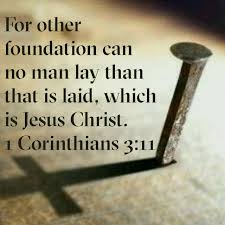 “For we are God’s fellow workers (synergos); you are God’s field, you are God’s building (oikodomē) According to the grace of God which was given to me, as a wise master builder I have laid the foundation, and another builds on it. But let each one take heed how he builds on it. For no other foundation can anyone lay than that which is laid, which is Jesus Christ.
“For we are God’s fellow workers (synergos); you are God’s field, you are God’s building (oikodomē) According to the grace of God which was given to me, as a wise master builder I have laid the foundation, and another builds on it. But let each one take heed how he builds on it. For no other foundation can anyone lay than that which is laid, which is Jesus Christ.
Now if anyone builds on this foundation with gold, silver, precious stones, wood, hay, straw, each one’s work will become clear (phaneros); for the Day will declare it, because it will be revealed (apokalyptō) by fire; and the fire will test each one’s work, of what sort it is.
If anyone’s work which he has built on it endures, he will receive a reward. If anyone’s work is burned, he will suffer loss; but he himself will be saved, yet so as through fire.
Do you not know that you are the temple of God and that the Spirit of God dwells in you? If anyone defiles the temple of God, God will destroy him. For the temple of God is holy, which temple you are.
Let no one deceive himself. If anyone among you seems to be wise in this age, let him become a fool that he may become wise.
For the wisdom of this world is foolishness with God. For it is written, “He catches the wise in their own craftiness”; and again, “The Lord knows the thoughts of the wise, that they are futile.”
Therefore let no one boast in men. For all things are yours: whether Paul or Apollos or Cephas, or the world or life or death, or things present or things to come—all are yours. And you are Christ’s, and Christ is God’s.” (1 Corinthians 3:9-23)

Jesus Christ will be our Personal Examiner
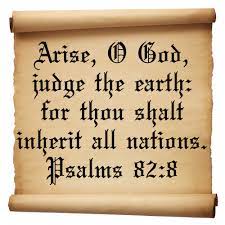
For we must all appear before the judgment seat of Christ, so that each one may receive good or evil, according to what he has done in the body. (2 Corinthians 5:10 RSV)
...This is oftentimes a very frightening and misunderstood concept to many people. The apostle speaks of a "judgment seat," and that always strikes terror to our hearts. Many people, I am afraid, identify this with that sobering and imposing scene in the 20th chapter of Revelation where all the dead, small and great, are standing before the "great white throne" of God. In an awesome moment of judgment "the books are opened" (Revelation 20:12), it says, lives are reviewed and eternal destinies are settled. It is a terribly impressive scene, and many think that this is what this refers to.
But, if you read it that way, you have totally missed the point of the Scripture. This is not a judgment to settle destiny. This is a personal evaluation given to each individual by the Lord himself of what his life has really been like. It is as though you and the Lord walked together back through all the scenes of your life and he pointed out to you the real nature of what you did and what you said and what was behind it all.
The primary characteristic of the "judgment seat" is that it is a time of disclosure to us of what has been hidden in the silent, inner reaches of our own hearts. And not only a disclosure to us, but also to others. In fact, the word that is used here is a very interesting one. It says, "we shall all appear." Literally it is, "we shall all be manifested," "we shall all be unveiled," in a sense, at the judgment seat of Christ, in the eyes of everyone. That is the point. This is the moment Jesus spoke of when he said, "Whatever is spoken in the secret places shall be shouted from the housetops." And it is described for us in the First Corinthian letter, Chapter 4, where Paul says, "Therefore, do not pronounce judgment before the time before the Lord comes, who will bring to light the things now hidden in darkness and will disclose the purposes of the heart," (1 Corinthians 4:5 RSV). That is what he is talking about.
God's concern is not, as we often think, with what we do so much as why we do it. There are, of course, some things that we are not to do that would bother him if we did them. There are certain clear-cut areas of sin that are always sin. They are mentioned everywhere in the Scripture -- murder, adultery, lying, stealing, etc. These are always and invariably wrong, and to do them means to displease the Lord.
But also there are a great many things that are apparently right that you can do and still be displeasing to the Lord. If the reason you do them is to gain glory or fame for yourself or to get even with somebody else or to establish some wrong, inordinate relationship of which God does not approve, they are wrong. Your motive is important. And more than that, as we have been learning from this passage, what you count on, your resource, is important to God. On what do you count for success -- your ability, your education, your training, your background, something coming from you? Or do you count on the God who indwells you to do the work and to carry it through to success, in his eyes if not in the eyes of men? That is what pleases God.
There is a verse in Hebrews that tells us that, "without faith it is impossible to please God," Hebrews 11:6). Faith must be present in what we do, or whatever we do is not pleasing to him. Paul understands this, therefore he wants that moment before the judgment seat of Christ to be a moment of disclosure that will not be of shame to him, of facing things that he refused to face in life, but a moment of joy. The Lord will have the joy of showing him many things that he thought were failures that were really successes, and things that he did that no one heard anything about will be brought to light and vividly displayed before others.
So it is a time of disclosure, but it is also a time of evaluation when we learn for the first time who was right and what attitudes we should have had or should not have had. It is a helpful time of seeing the truth about ourselves. If that frightens you, I want to tell you this: There is something you can do about it. It is found in First Corinthians 11 where Paul says, "If we judged ourselves truly, we should not be judged," (1 Corinthians 11:31 RSV). This is what he is talking about. The judgment seat of Christ, in a sense, has already started. This is what the Lord does with me all the time. Does he do it with you? He is always, by his Spirit, pointing out to me that I had a wrong attitude or a wrong motive for doing something. Sometimes he points out a right motive and he confirms in me that I was doing the right thing with a right attitude and whether people accept it or not he understood. That is the judgment seat of Christ going on. If we will allow ourselves to face truth like that now, we do not have to face it at the judgment seat of Christ. It will not be brought out there because it will already have been settled.
That is why it is so important that, as we grow as Christians, we allow the Lord to let us see ourselves the way we really are. We should not fight back and refuse to acknowledge that he is right about things. The mark of spiritual progress is always the awareness we increasingly have of all the possibilities and potential for evil that lie in our hearts. That has been my case. I find that the older I grow the more aware I am of how wrong I have been, how many people I have hurt unwittingly, and the increasing sense of the control that evil has had over me in my life and in my relationships. Yet that does not make me despair because I know that God has seen it all from the beginning. He has dealt with it and set it aside. That is not the basis of my relationship to him at all. He has given me the gift of righteousness. He loves me. He likes me. That is my relationship to him. Now all this is true at the judgment seat of Christ as well. It will be a time of disclosure, of evaluation, but also a time of encouragement where we will see and learn the real value of many things that we thought no one knew about and which we ourselves did not often understand. (Rat Stedman, What's There to Live For?)

|
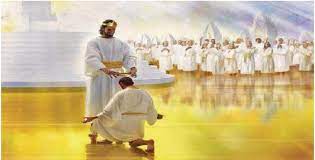
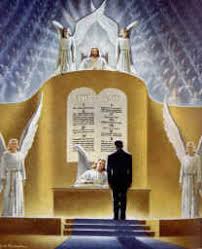
"Why do you pass judgement on your brother or sister? Or you, why do you despise your brother or sister?
For we will all stand before the judgement seat of God. For it is written,
‘As I live, says the Lord, every knee shall bow to me,
and every tongue shall give praise to God.’
So then, each of us will be accountable to God." (Romans 14:10-12)
The Judgment Seat of Christ will not be about sin! Jesus has paid in full for all our sins. The Bema will, however, be a full performance review. It will be thorough, going to motive.
Hebrews 4:12 says, “...the word of God is living and active, sharper than any two-edged sword, piercing to the division of soul and spirit, of joints and marrow, and discerning the thoughts and intentions of the heart.”
Most of us remember our past mistakes and accomplishments. God has the actual facts, He has a complete data base, and His searching eyes will reveal all our hearts. Mostly He will heal and restore. But the heat will be turned up! Obviously we can't be allowed into heaven (New Jerusalem) if we are contaminated with evil at all levels of our lives, conscious or unconscious. Right motives matter as well, but God knows us far better than one and his evaluation is what matters. We are house guests in His universe in the first place and many will will be left out of His coming kingdom.
"For to everyone who has, more will be given, and he will have abundance; but from him who does not have, even what he has will be taken away. And cast the unprofitable servant into the outer darkness. There will be weeping and gnashing of teeth."
When the Son of Man comes in His glory, and all the holy angels with Him, then He will sit on the throne of His glory.
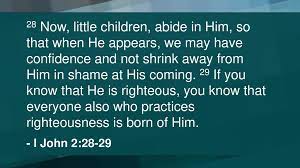 All the nations will be gathered before Him, and He will separate them one from another, as a shepherd divides his sheep from the goats. And He will set the sheep on His right hand, but the goats on the left. Then the King will say to those on His right hand, ‘Come, you blessed of My Father, inherit the kingdom prepared for you from the foundation of the world: for I was hungry and you gave Me food; I was thirsty and you gave Me drink; I was a stranger and you took Me in; I was naked and you clothed Me; I was sick and you visited Me; I was in prison and you came to Me.’
All the nations will be gathered before Him, and He will separate them one from another, as a shepherd divides his sheep from the goats. And He will set the sheep on His right hand, but the goats on the left. Then the King will say to those on His right hand, ‘Come, you blessed of My Father, inherit the kingdom prepared for you from the foundation of the world: for I was hungry and you gave Me food; I was thirsty and you gave Me drink; I was a stranger and you took Me in; I was naked and you clothed Me; I was sick and you visited Me; I was in prison and you came to Me.’
“Then the righteous will answer Him, saying, ‘Lord, when did we see You hungry and feed You, or thirsty and give You drink? When did we see You a stranger and take You in, or naked and clothe You? Or when did we see You sick, or in prison, and come to You?’
And the King will answer and say to them, ‘Assuredly, I say to you, inasmuch as you did it to one of the least of these My brethren, you did it to Me.’ “Then He will also say to those on the left hand, ‘Depart from Me, you cursed, into the everlasting fire prepared for the devil and his angels: for I was hungry and you gave Me no food; I was thirsty and you gave Me no drink; I was a stranger and you did not take Me in, naked and you did not clothe Me, sick and in prison and you did not visit Me.’
“Then they also will answer Him, saying, ‘Lord, when did we see You hungry or thirsty or a stranger or naked or sick or in prison, and did not minister to You?’
Then He will answer them, saying, ‘Assuredly, I say to you, inasmuch as you did not do it to one of the least of these, you did not do it to Me.’ And these will go away into everlasting punishment, but the righteous into eternal life.” (Matthew 25:29-46) (Reference: The Unconscious Test, by Ray Stedman)

Psalm 51

Be gracious to me, O God, according to Your lovingkindness;
According to the greatness of Your compassion blot out my transgressions.
Wash me thoroughly from my iniquity
And cleanse me from my sin.
For I know my transgressions,
And my sin is ever before me.
Against You, You only, I have sinned
And done what is evil in Your sight,
So that You are justified when You speak
And blameless when You judge.
Behold, I was brought forth in iniquity,
And in sin my mother conceived me.
Behold, You desire truth in the innermost being,
And in the hidden part You will make me know wisdom.
Purify me with hyssop, and I shall be clean;
Wash me, and I shall be whiter than snow.
Make me to hear joy and gladness,
Let the bones which You have broken rejoice.
Hide Your face from my sins
And blot out all my iniquities.
Create in me a clean heart, O God,
And renew a steadfast spirit within me.
Do not cast me away from Your presence
And do not take Your Holy Spirit from me.
Restore to me the joy of Your salvation
And sustain me with a willing spirit.
Then I will teach transgressors Your ways,
And sinners will be converted to You.
Deliver me from blood guiltiness, O God, the God of my salvation;
Then my tongue will joyfully sing of Your righteousness.
O Lord, open my lips,
That my mouth may declare Your praise.
For You do not delight in sacrifice, otherwise I would give it;
You are not pleased with burnt offering.
The sacrifices of God are a broken spirit;
A broken and a contrite heart, O God, You will not despise.
By Your favor do good to Zion;
Build the walls of Jerusalem.
Then You will delight in righteous sacrifices,
In burnt offering and whole burnt offering;
Then young bulls will be offered on Your altar.

Our God is a Refining Fire
 The best imagery familiar to most of us is the refiner’s fire.
The best imagery familiar to most of us is the refiner’s fire.
When minerals deep in the earth are mined and brought to the surface pure gold, pure silver, copper, tin, lead zinc and so on usually mixed with less valuable minerals —- and plenty of waste rock. Extracting the gold or other valuable material must be profitable or the mine shuts down. Market prices drive investors and mine operators.
Background Information on gold and Gold Mining. Notes about Gold for the ordinary person.
Desired minerals mixed with waste rock are sorted and mechanically processed often elaborately before final crushing and refining in a furnace.
The profit margin for the mine owner is always the controlling factor in the industry.
Notice how the words of Peter in his first letter allude to our cleansing, refining, purifying:
Blessed be the God and Father of our Lord Jesus Christ! According to his great mercy, he has caused us to be born again to a living hope through the resurrection of Jesus Christ from the dead, to an inheritance that is imperishable, undefiled, and unfading, kept in heaven for you, who by God's power are being guarded through faith for a salvation ready to be revealed in the last time. In this you rejoice, though now for a little while, if necessary, you have been grieved by various trials, so that the tested genuineness of your faith—more precious than gold that perishes though it is tested by fire—may be found to result in praise and glory and honor at the revelation of Jesus Christ. Though you have not seen him, you love him. Though you do not now see him, you believe in him and rejoice with joy that is inexpressible and filled with glory, obtaining the outcome of your faith, the salvation of your souls.
Concerning this salvation, the prophets who prophesied about the grace that was to be yours searched and inquired carefully, inquiring what person or time the Spirit of Christ in them was indicating when he predicted the sufferings of Christ and the subsequent glories. It was revealed to them that they were serving not themselves but you, in the things that have now been announced to you through those who preached the good news to you by the Holy Spirit sent from heaven, things into which angels long to look.
Therefore, preparing your minds for action, and being sober-minded, set your hope fully on the grace that will be brought to you at the revelation of Jesus Christ. As obedient children, do not be conformed to the passions of your former ignorance, but as he who called you is holy, you also be holy in all your conduct, since it is written, “You shall be holy, for I am holy.” And if you call on him as Father who judges impartially according to each one's deeds, conduct yourselves with fear throughout the time of your exile, knowing that you were ransomed from the futile ways inherited from your forefathers, not with perishable things such as silver or gold, but with the precious blood of Christ, like that of a lamb without blemish or spot. He was foreknown before the foundation of the world but was made manifest in the last times for the sake of you who through him are believers in God, who raised him from the dead and gave him glory, so that your faith and hope are in God.
Having purified your souls by your obedience to the truth for a sincere brotherly love, love one another earnestly from a pure heart, since you have been born again, not of perishable seed but of imperishable, through the living and abiding word of God; for
“All flesh is like grass
and all its glory like the flower of grass.
The grass withers,
and the flower falls,
but the word of the Lord remains forever.”
And this word is the good news that was preached to you.

We have a beautiful picture of the fireproof nature of those who are “in Christ” in the book of Daniel Chapter 3.
Nebuchadnezzar the king made an image of gold, whose height was sixty cubits and its width six cubits. He set it up in the plain of Dura, in the province of Babylon. And King Nebuchadnezzar sent word to gather together the satraps, the administrators, the governors, the counselors, the treasurers, the judges, the magistrates, and all the officials of the provinces, to come to the dedication of the image which King Nebuchadnezzar had set up. So the satraps, the administrators, the governors, the counselors, the treasurers, the judges, the magistrates, and all the officials of the provinces gathered together for the dedication of the image that King Nebuchadnezzar had set up; and they stood before the image that Nebuchadnezzar had set up. Then a herald cried aloud: “To you it is commanded, O peoples, nations, and languages, that at the time you hear the sound of the horn, flute, harp, lyre, and psaltery, in symphony with all kinds of music, you shall fall down and worship the gold image that King Nebuchadnezzar has set up; and whoever does not fall down and worship shall be cast immediately into the midst of a burning fiery furnace.”
So at that time, when all the people heard the sound of the horn, flute, harp, and lyre, in symphony with all kinds of music, all the people, nations, and languages fell down and worshiped the gold image which King Nebuchadnezzar had set up.
Therefore at that time certain Chaldeans came forward and accused the Jews. They spoke and said to King Nebuchadnezzar, “O king, live forever! You, O king, have made a decree that everyone who hears the sound of the horn, flute, harp, lyre, and psaltery, in symphony with all kinds of music, shall fall down and worship the gold image; and whoever does not fall down and worship shall be cast into the midst of a burning fiery furnace. There are certain Jews whom you have set over the affairs of the province of Babylon: Shadrach, Meshach, and Abed-Nego; these men, O king, have not paid due regard to you. They do not serve your gods or worship the gold image which you have set up.”
Then Nebuchadnezzar, in rage and fury, gave the command to bring Shadrach, Meshach, and Abed-Nego. So they brought these men before the king. Nebuchadnezzar spoke, saying to them, “Is it true, Shadrach, Meshach, and Abed-Nego, that you do not serve my gods or worship the gold image which I have set up? Now if you are ready at the time you hear the sound of the horn, flute, harp, lyre, and psaltery, in symphony with all kinds of music, and you fall down and worship the image which I have made, good! But if you do not worship, you shall be cast immediately into the midst of a burning fiery furnace. And who is the god who will deliver you from my hands?”
Shadrach, Meshach, and Abed-Nego answered and said to the king, “O Nebuchadnezzar, we have no need to answer you in this matter. If that is the case, our God whom we serve is able to deliver us from the burning fiery furnace, and He will deliver us from your hand, O king. But if not, let it be known to you, O king, that we do not serve your gods, nor will we worship the gold image which you have set up.”
Then Nebuchadnezzar was full of fury, and the expression on his face changed toward Shadrach, Meshach, and Abed-Nego. He spoke and commanded that they heat the furnace seven times more than it was usually heated. And he commanded certain mighty men of valor who were in his army to bind Shadrach, Meshach, and Abed-Nego, and cast them into the burning fiery furnace. Then these men were bound in their coats, their trousers, their turbans, and their other garments, and were cast into the midst of the burning fiery furnace. Therefore, because the king’s command was urgent, and the furnace exceedingly hot, the flame of the fire killed those men who took up Shadrach, Meshach, and Abed-Nego. And these three men, Shadrach, Meshach, and Abed-Nego, fell down bound into the midst of the burning fiery furnace.
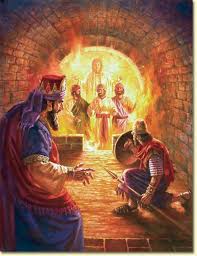 Then King Nebuchadnezzar was astonished; and he rose in haste and spoke, saying to his counselors, “Did we not cast three men bound into the midst of the fire?”
Then King Nebuchadnezzar was astonished; and he rose in haste and spoke, saying to his counselors, “Did we not cast three men bound into the midst of the fire?”
They answered and said to the king, “True, O king.”
“Look!” he answered, “I see four men loose, walking in the midst of the fire; and they are not hurt, and the form of the fourth is like the Son of God.”
Then Nebuchadnezzar went near the mouth of the burning fiery furnace and spoke, saying, “Shadrach, Meshach, and Abed-Nego, servants of the Most High God, come out, and come here.” Then Shadrach, Meshach, and Abed-Nego came from the midst of the fire. And the satraps, administrators, governors, and the king’s counselors gathered together, and they saw these men on whose bodies the fire had no power; the hair of their head was not singed nor were their garments affected, and the smell of fire was not on them.
Nebuchadnezzar spoke, saying, “Blessed be the God of Shadrach, Meshach, and Abed-Nego, who sent His Angel and delivered His servants who trusted in Him, and they have frustrated the king’s word, and yielded their bodies, that they should not serve nor worship any god except their own God! Therefore I make a decree that any people, nation, or language which speaks anything amiss against the God of Shadrach, Meshach, and Abed-Nego shall be cut in pieces, and their houses shall be made an ash heap; because there is no other God who can deliver like this.”
Then the king promoted Shadrach, Meshach, and Abed-Nego in the province of Babylon.

A vivid image of faith -- tried and tested -- is given to us in Malachi, the last book of the Old Testament.
Behold, I send My messenger,
And he will prepare the way before Me.
And the Lord, whom you seek,
Will suddenly come to His temple,
Even the Messenger of the covenant,
In whom you delight.
Behold, He is coming,”
Says the Lord of hosts.
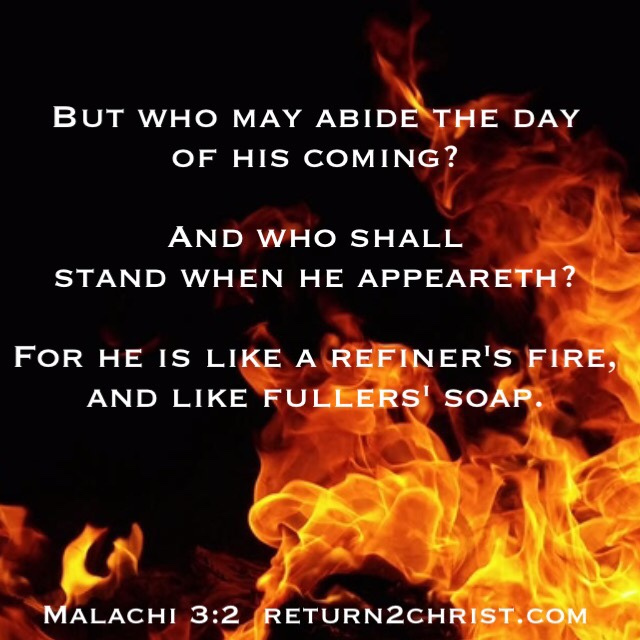
“But who can endure the day of His coming?
And who can stand when He appears?
For He is like a refiner’s fire
And like launderers’ soap.
He will sit as a refiner and a purifier of silver;
He will purify the sons of Levi,
And purge them as gold and silver,
That they may offer to the Lord
An offering in righteousness.
“Then the offering of Judah and Jerusalem
Will be pleasant to the Lord,
As in the days of old,
As in former years.
And I will come near you for judgment;
I will be a swift witness
Against sorcerers,
Against adulterers,
Against perjurers,
Against those who exploit wage earners and widows and orphans,
And against those who turn away an alien—
Because they do not fear Me,”
Says the Lord of hosts.
For I am the Lord, I do not change;
Therefore you are not consumed, O sons of Jacob.
Yet from the days of your fathers
You have gone away from My ordinances
And have not kept them.
Return to Me, and I will return to you,”
Says the Lord of hosts.
“But you said,
‘In what way shall we return?’

The Day of the Lord
Beloved, I now write to you this second epistle (in both of which I stir up your pure minds by way of reminder), that you may be mindful of the words which were spoken before by the holy prophets, and of the commandment of us, the apostles of the Lord and Savior, knowing this first: that scoffers will come in the last days, walking according to their own lusts, things continue as they were from the beginning of creation.” For this they willfully forget: that by the word of God the heavens were of old, and the earth standing out of water and in the water, by which the world that then existed perished, being flooded with water. But the heavens and the earth which are now preserved by the same word, are reserved for fire until the day of judgment and perdition of ungodly men.
But, beloved, do not forget this one thing, that with the Lord one day is as a thousand years, and a thousand years as one day. The Lord is not slack concerning His promise, as some count slackness, but is longsuffering toward not willing that any should perish but that all should come to repentance.
But the day of the Lord will come as a thief in the night, in which the heavens will pass away with a great noise, and the elements will melt with fervent heat; both the earth and the works that are in it will be burned up. Therefore, since all these things will be dissolved, what manner of persons ought you to be in holy conduct and godliness, looking for and hastening the coming of the day of God, because of which the heavens will be dissolved, being on fire, and the elements will melt with fervent heat? Nevertheless we, according to His promise, look for new heavens and a new earth in which righteousness dwells.
Therefore, beloved, looking forward to these things, be diligent to be found by Him in peace, without spot and blameless; and consider that the longsuffering of our Lord is salvation—as also our beloved brother Paul, according to the wisdom given to him, has written to you, as also in all his epistles, speaking in them of these things, in which are some things hard to understand, which untaught and unstable people twist to their own destruction, as they do also the rest of the Scriptures.
You therefore, beloved, since you know this beforehand, beware lest you also fall from your own steadfastness, being led away with the error of the wicked; but grow in the grace and knowledge of our Lord and Savior Jesus Christ. To Him be the glory both now and forever. Amen. (2 Peter 3)
Jesus Christ is a living person like us. He has fully identified with all of us. He does not ask us to go where He has not already gone. This is what it means when the New Testament says we followers of Jesus are "in Christ."
The Last Judgment
--for those who reject Jesus Christ
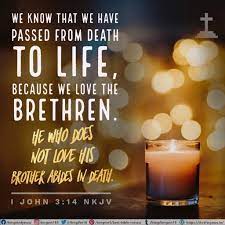

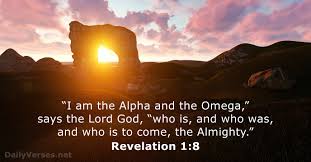
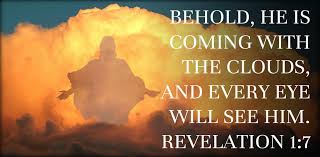
"Behold, He is coming with clouds, and every eye will see Him, even they who pierced Him. And all the tribes of the earth will mourn because of Him. Even so, Amen.
I am the Alpha and the Omega, the Beginning and the End,” says the Lord, “who is and who was and who is to come, the Almighty...
Then I turned to see the voice that spoke with me. And having turned I saw seven golden lampstands, and in the midst of the seven lampstands One like the Son of Man, clothed with a garment down to the feet and girded about the chest with a golden band.
His head and hair were white like wool, as white as snow, and His eyes like a flame of fire; His feet were like fine brass, as if refined in a furnace, and His voice as the sound of many waters; He had in His right hand seven stars, out of His mouth went a sharp two-edged sword, and His countenance was like the sun shining in its strength. And when I saw Him, I fell at His feet as dead. But He laid His right hand on me, saying to me, “Do not be afraid; I am the First and the Last. I am He who lives, and was dead, and behold, I am alive forevermore. Amen. And I have the keys of Hades and of Death. Write the things which you have seen, and the things which are, and the things which will take place after this. The mystery of the seven stars which you saw in My right hand, and the seven golden lampstands: The seven stars are the angels of the seven churches, and the seven lampstands which you saw are the seven churches." (Revelation 1:7-20)

Who is in Charge of your Life?
Jesus or King Ego?
When Joshua was by Jericho he lifted up his eyes and looked
and behold a man was standing before him with his drawn sword in his hand.
And Joshua to him and said to him,
Are you for us or for our adversaries.
But he said, No but I am the commander of the army of the LORD. Now I have come.
And Joshua fell on his face to the earth and worshiped and said to him,
What does my lord say to his servant?
And the commander of the LORD's army said to Joshua,
Take off your sandals from your feet for the place where you are standing is holy.
And Joshua did.
(Joshua 5:13)
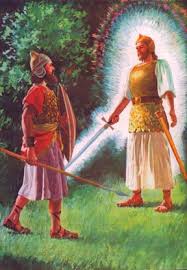

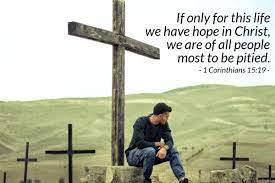

Music for today
A Glorious Church
I Sing the Mighty Power of God
Jesus, The Light of the World
Pachelbel: Canon in D
Lambert Dolphin
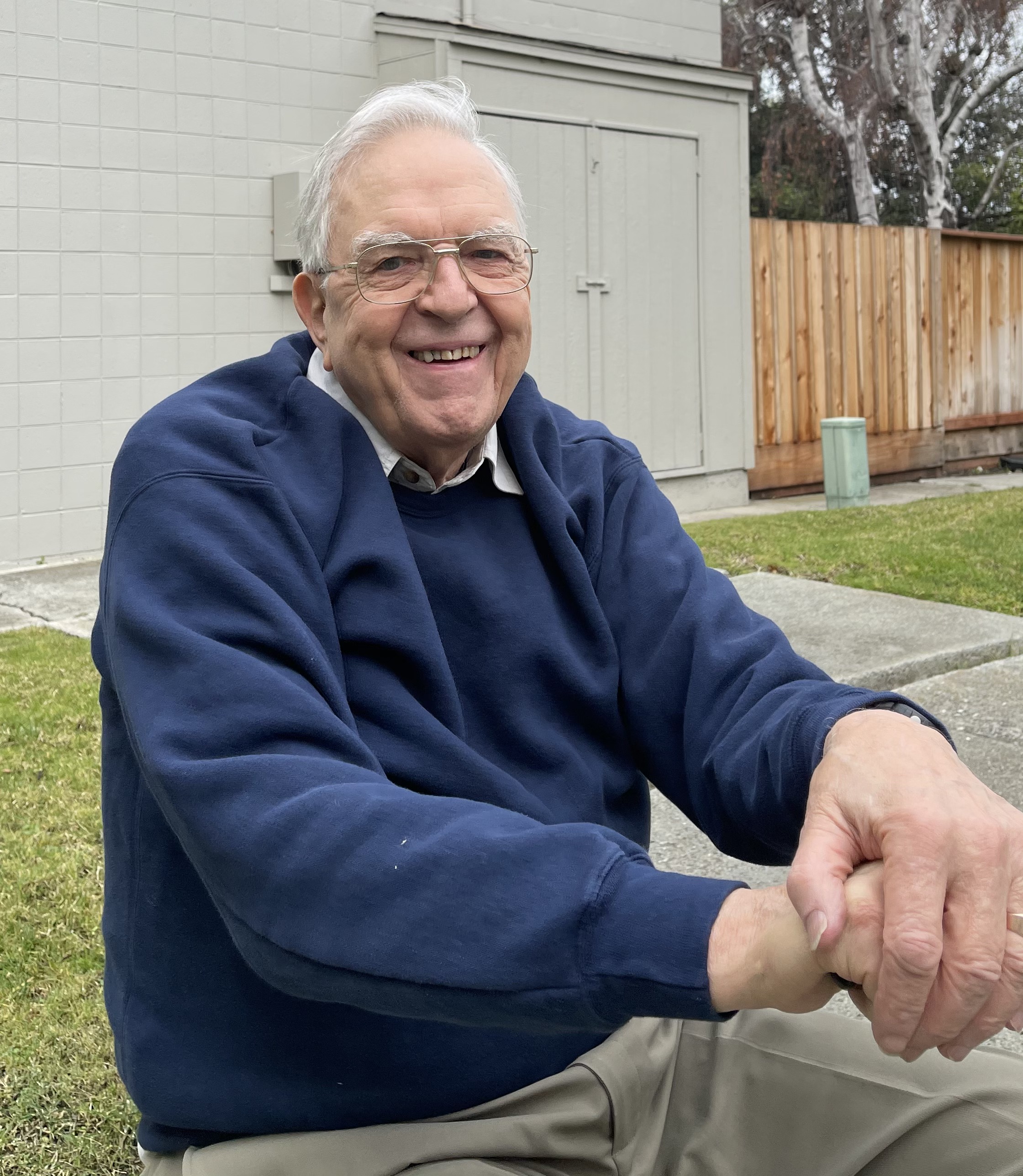
Email is welcome
Lambert Dolphin's Place
Newsletters Old and New
Library Annex (900+ new articles since 2018)
Help Thyself. No Charge

Contributions
Interviews
 s
s
June 24, 2022. September 9. 2022. August 15, 2023. September 33, 2023.
\

![]()


 “For we are God’s fellow workers (synergos); you are God’s field, you are God’s building (oikodomē) According to the grace of God which was given to me, as a wise master builder I have laid the foundation, and another builds on it. But let each one take heed how he builds on it. For no other foundation can anyone lay than that which is laid, which is Jesus Christ.
“For we are God’s fellow workers (synergos); you are God’s field, you are God’s building (oikodomē) According to the grace of God which was given to me, as a wise master builder I have laid the foundation, and another builds on it. But let each one take heed how he builds on it. For no other foundation can anyone lay than that which is laid, which is Jesus Christ.




 All the nations will be gathered before Him, and He will separate them one from another, as a shepherd divides his sheep from the goats. And He will set the sheep on His right hand, but the goats on the left. Then the King will say to those on His right hand, ‘Come, you blessed of My Father, inherit the kingdom prepared for you from the foundation of the world: for I was hungry and you gave Me food; I was thirsty and you gave Me drink; I was a stranger and you took Me in; I was naked and you clothed Me; I was sick and you visited Me; I was in prison and you came to Me.’
All the nations will be gathered before Him, and He will separate them one from another, as a shepherd divides his sheep from the goats. And He will set the sheep on His right hand, but the goats on the left. Then the King will say to those on His right hand, ‘Come, you blessed of My Father, inherit the kingdom prepared for you from the foundation of the world: for I was hungry and you gave Me food; I was thirsty and you gave Me drink; I was a stranger and you took Me in; I was naked and you clothed Me; I was sick and you visited Me; I was in prison and you came to Me.’
 The best imagery familiar to most of us is the refiner’s fire.
The best imagery familiar to most of us is the refiner’s fire.
 Then King Nebuchadnezzar was astonished; and he rose in haste and spoke, saying to his counselors, “Did we not cast three men bound into the midst of the fire?”
Then King Nebuchadnezzar was astonished; and he rose in haste and spoke, saying to his counselors, “Did we not cast three men bound into the midst of the fire?”







